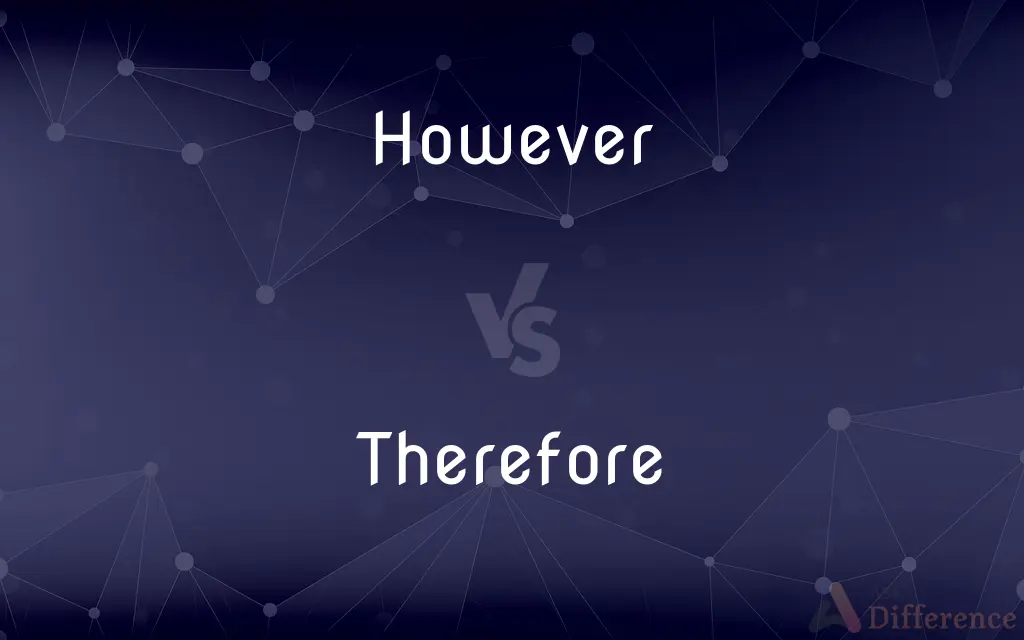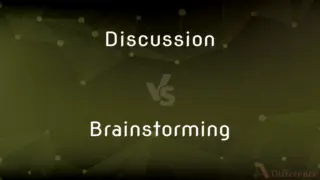However vs. Therefore — What's the Difference?
Edited by Tayyaba Rehman — By Maham Liaqat — Updated on April 25, 2024
"However" is used to introduce a contrast or exception to what has been previously stated, while "therefore" is used to introduce a conclusion or result based on what has been stated before.

Difference Between However and Therefore
Table of Contents
ADVERTISEMENT
Key Differences
"However" signals a shift in the direction of the argument or introduces a contrasting point, indicating divergence from the thought expressed in the previous sentence. On the other hand, "therefore" suggests a sequence, leading to a logical conclusion or result from the preceding statement.
Used typically at the beginning or middle of a sentence, "however" can also serve to soften a contradiction or add complexity to an analysis. Whereas "therefore" is commonly placed at the start of a sentence to emphasize the causality in an argument.
"However" can be replaced by synonyms such as "nevertheless" or "nonetheless," which similarly indicate contrast without altering the meaning of the sentence significantly. On the other hand, "therefore" is synonymous with "consequently" and "as a result," emphasizing a cause-effect relationship.
In terms of punctuation, "however" is often followed by a comma when used to introduce a sentence and can be preceded by a semicolon when used to separate two independent clauses within the same sentence. In contrast, "therefore" is usually preceded by a semicolon or a period and followed by a comma when used to separate clauses.
While "however" is useful for discussing exceptions or differing opinions, making it common in debates or analytical discussions, "therefore" is used when deducing conclusions, making it frequent in academic writing and formal arguments.
ADVERTISEMENT
Comparison Chart
Unction
Introduces a contrast or exception.
Introduces a conclusion or result.
Common Synonyms
Nevertheless, nonetheless.
Consequently, as a result.
Typical Placement
Beginning or middle of a sentence.
Usually at the beginning of a sentence.
Punctuation
Followed by a comma, can be preceded by a semicolon.
Preceded by a semicolon or a period, followed by a comma.
Usage Context
Debates, analytical discussions.
Academic writing, formal arguments.
Compare with Definitions
However
Used to introduce a contrasting statement.
He wanted to go outside; however, it was raining.
Therefore
Used to introduce a conclusion based on previous information.
It is raining; therefore, we should cancel the picnic.
However
Indicates an exception to what has been stated.
The plan was sound; however, the execution was flawed.
Therefore
Common in deductive reasoning.
All men are mortal; Socrates is a man; therefore, Socrates is mortal.
However
Often paired with transitions in thought.
She was qualified for the job; however, she lacked experience.
Therefore
Indicates causality and direct results.
He did not study; therefore, he failed the exam.
However
Can soften a contradiction in the discussion.
I agree with your point; however, we must consider the budget.
Therefore
Helps assert a final decision or opinion.
The project is over budget; therefore, it must be halted.
However
Adds complexity or nuance to an argument.
The results were promising; however, further research is needed.
Therefore
Frequent in academic and formal contexts.
The data is conclusive; therefore, the hypothesis is accepted.
However
In spite of that; nevertheless; yet
The book is expensive.
However, it's worth it.
Therefore
For that reason or cause; consequently or hence.
However
On the other hand; by contrast
The first part was easy.
The second, however, took hours.
Therefore
(conjunctive) Consequently, by or in consequence of that or this cause; referring to something previously stated.
Traditional values will always have a place. Therefore, they will never lose relevance.
However
To whatever degree or extent
"The prospect of success, however remote, was tantalizing" (Stephen Baker).
Therefore
For that; for it (in reference to a previous statement)
However
In what way. Used as an intensive of how
However did you get here so soon?.
Therefore
For that or this reason, referring to something previously stated; for that.
I have married a wife, and therefore I can not come.
Behold, we have forsaken all, and followed thee; what shall we have therefore?
However
In whatever manner or way that
Dress however you like.
Therefore
Consequently; by consequence.
He blushes; therefore he is guilty.
However
(Archaic) Notwithstanding that; although
"Howe'er thou art a fiend, / a woman's shape doth shield thee" (Shakespeare).
Therefore
(used to introduce a logical conclusion) from that fact or reason or as a result;
Therefore X must be true
The eggs were fresh and hence satisfactory
We were young and thence optimistic
It is late and thus we must go
The witness is biased and so cannot be trusted
However
(conjunctive) Nevertheless; yet, still; in spite of that.
He told me not to do it. However, I did it anyway. / I did it anyway, however. / I, however, did it anyway.
She wanted to go; however, she decided against it.
I didn't argue with him; I still think, however, that he is wrong.
Therefore
As a consequence;
He had good reason to be grateful for the opportunities which they had made available to him and which consequently led to the good position he now held
However
(conjunctive) In contrast.
The conference itself went very well. The party afterwards, however, was a disaster.
However
(degree) To whatever degree or extent.
However clear you think you've been, many questions will remain.
However
In any way that one likes or chooses; in a haphazard or spontaneous way.
I don't care; just do it however.
Nothing was really planned; things just happened however.
However
(interrogative) How ever: an emphatic form of how, used to ask in what manner.
I thought it was impossible. However were you able to do it?
However
(obsolete) In any case, at any rate, at all events.
However
Regardless of the way in which.
Let me know when you've had your interview, however it goes.
However we do this, it isn't going to work.
However
In any way in which.
She offered to help however she could.
Wear your hair however you want.
However
(proscribed) But, yet, though, although.
However
In whetever manner, way, or degree.
However yet they me despise and spite.
Howe'er the business goes, you have made fault.
However
At all events; at least; in any case.
Our chief end is to be freed from all, if it may be, however from the greatest evils.
However
Nevertheless; notwithstanding; yet; still; though; as, I shall not oppose your design; I can not, however, approve of it.
In your excuse your love does little say;You might howe'er have took a better way.
However
Despite anything to the contrary (usually following a concession);
Although I'm a little afraid, however I'd like to try it
While we disliked each other, nevertheless we agreed
He was a stern yet fair master
Granted that it is dangerous, all the same I still want to go
However
By contrast; on the other hand;
The first part was easy; the second, however, took hours
However
To whatever degree or extent;
The results, however general, are important
They have begun, however reluctantly, to acknowledge the legitimacy of some of the opposition's concerns
However
In whatever way or manner;
Victory, however it was brought about, was sweet
However he did it, it was very clever
However
In what way or manner or by what means (`however' is sometimes used as an intensive form of `how');
How did you catch the snake?
He told us how he did it
However did you get here so soon?
Common Curiosities
Can "however" and "therefore" be used interchangeably?
No, they serve different purposes; "however" introduces contrast, while "therefore" introduces causality.
What is the difference in the placement of "however" and "therefore" in a sentence?
"However" can appear at the beginning or in the middle, while "therefore" usually starts a sentence or follows a semicolon.
What punctuation follows "however"?
"However" is typically followed by a comma when it begins a sentence or clause.
What does "however" imply in a sentence?
"However" implies a contrast or exception to the previously stated information.
Why is "therefore" significant in academic writing?
"Therefore" is used to draw conclusions, a critical component of presenting research findings and theories in academia.
Are there scenarios where using "however" is more appropriate than "therefore"?
Yes, in contexts where presenting a contrasting opinion or correction is necessary, "however" is more appropriate.
Can "however" start a new paragraph?
Yes, "however" can start a new paragraph to introduce a contrasting point effectively.
How is "therefore" used to structure arguments?
"Therefore" is used to present a logical conclusion or result derived from the arguments or data presented before it.
Is "however" informal?
No, "however" is formal and commonly used in professional and academic writings to introduce contrast.
What are the synonyms of "therefore"?
Synonyms include "consequently" and "as a result."
What is the impact of using "however" in debates?
In debates, "however" is used to introduce counterpoints and mitigate direct opposition, adding depth to the discussion.
What are the synonyms of "however"?
Synonyms include "nevertheless" and "nonetheless."
How does "therefore" help in formal arguments?
"Therefore" helps in structuring and substantiating arguments by linking cause and effect clearly.
Does "therefore" imply a stronger connection than "however"?
Yes, "therefore" implies a direct causal connection, which is typically stronger and more definitive than the contrasting connection implied by "however."
Why might someone use "therefore" in a conclusion?
"Therefore" is used in conclusions to summarize and affirm the logical outcome of the argument or data presented.
Share Your Discovery

Previous Comparison
Discussion vs. Brainstorming
Next Comparison
Satanism vs. WiccaAuthor Spotlight
Written by
Maham LiaqatEdited by
Tayyaba RehmanTayyaba Rehman is a distinguished writer, currently serving as a primary contributor to askdifference.com. As a researcher in semantics and etymology, Tayyaba's passion for the complexity of languages and their distinctions has found a perfect home on the platform. Tayyaba delves into the intricacies of language, distinguishing between commonly confused words and phrases, thereby providing clarity for readers worldwide.















































